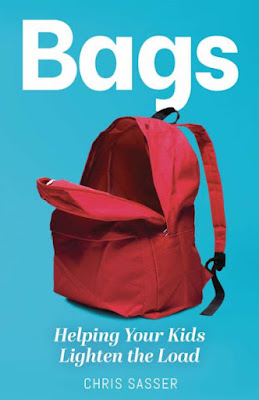The book is a good reminder that children are always trying to make sense of the world, and in doing so, they often interpret events in ways detrimental to their development. Whether it's not making the team or trying on different identities, young people can often believe lies about themselves and their capabilities.
Sasser lists some specific "bags" that children fill: the relational bag, the performance bag, the identity bag, the comparison bathe authority bag, the rejection bag, the guilt and shame bag, the disappointment bag. All are interrelated and can be getting filled at the same time. Rejection by peers fills the rejection bag and the relational bag. As parents, and teachers, out job, then, is to help our kids reframe these events and "lighten the load."
While Sasser's book is a good reminder, it struck an off-chord note with me. While I'm sure that parents (and teachers) can help young people to not pack or to unpack those bags, I think it's only at the margins. Kids are notorious for hearing and believing things that shock adults. (Regan once believed her dad would be so old as to be in a wheelchair by 35!) Most of the time the adults have no idea how the child is processing a particular event. Sasser doesn't really acknowledge this. He seems to assume that the events will be obvious and our response just needs to be trained to redirect and speak truth.
While his advice is helpful when the circumstances are obvious, I think a missing part of the book is teaching kids resiliency. We need to teach kids how to redirect and reframe those negative thoughts before they get packed in the bags. The most helpful part, therefore, was his insistence that we constantly speak truth into the child's life. We constantly affirm that they are loved and valued and a child of God. We tell them of our pride in their specific characteristics and actions. We offer shield for the flaming arrows that life will throw at them.
I appreciate the way he pointed out the fiery darts, but I think more emphasis on building the armor would be helpful.

No comments:
Post a Comment